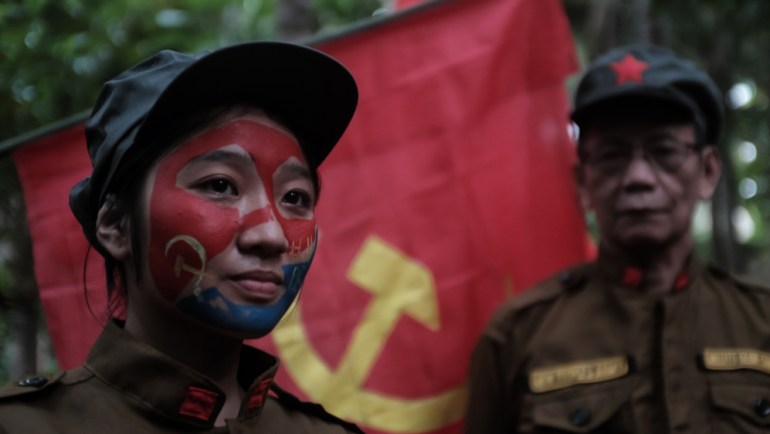Outcry after Filipino doctor on front line of pandemic shot dead
Dr Mary Rose Sancelan shot dead alongside her husband after being linked to communist rebels in Negros, where several other activists have also been killed.

A Filipino doctor who led her community’s response to the coronavirus pandemic has been killed along with her husband in the Philippines’s Negros, a central island that has become the epicentre of targeted killings of activists, land rights advocates and other perceived critics of the government.
Dr Mary Rose Sancelan and her husband Edwin were on their way home on Tuesday afternoon when they were shot at multiple times by unidentified gunmen in the city of Guihulngan, according to local media reports.
Keep reading
list of 3 itemsPhilippine army under fire over alleged war crime after killing
Dead baby caught in tug of war between Duterte’s police, activist
The attackers fled on motorcycles and the couple, who had sustained multiple gunshot wounds, were rushed to the nearest hospital. But they were pronounced dead on arrival.
According to local media reports, police recovered at least 15 bullet casings from the scene.
Until her death, Sancelan was the head of Guihulngan’s Inter-Agency Task Force for the Management of Emerging Infectious Diseases, which handles the government response against COVID-19. She was also the only medical doctor serving Guihulngan, a city of more than 100,000 people.
In a statement on Wednesday, the government of Guihulngan said it “reels from the loss of a courageous and dedicated front liner”.
“We are confused and in shock at this painful fate befalling our fellow public servants.”
‘Red-tagging’
According to the rights group, Karapatan, Sancelan was on top of a list of targets drawn by an anti-communist militia group called Kagubak. At least five other people on the list, including an activist and a human rights lawyer, were also killed in 2018 and 2019.
Cristina Palabay, the secretary-general of Karapatan, denounced the latest killings as “deplorable”, linking it to the broader government practice of “red-tagging” or labelling activists and other critics as communists.
Since peace talks between the government and the communist rebels broke down in late 2017, President Rodrigo Duterte has stepped up criticism of the group, which has been waging almost half a century of armed rebellion that has killed tens of thousands of people.

In 2018, Duterte issued an executive order forming a special task force led by the military to eliminate the rebels. He had also declared the rebels as a “terrorist” group, and offered bounties for the killings of their members.
Administration critics and human rights watchdogs, however, said that the new government entity is being used to target not just armed fighters, but anyone critical of Duterte’s presidency. They also said the “culture of impunity” under his administration has allowed anyone to target individuals without fear of the justice system.
Before her death, Sancelan had expressed her apprehension about being tagged as a communist leader.
“I feel helpless. Every time I go out to work, I get paranoid. Of course, we are afraid to get killed. I am no longer free to go to the countryside to do school-based immunisations,” she was quoted as saying in a video posted on social media.
Sancelan was not known to be affiliated with any activist organisations, although she reportedly spoke against the spate of killings in her community.
In a statement on Wednesday, the Philippines’ Commission on Human Rights said that it was “troubled” by the news and “condemns” the killing of Sancelan and her husband.
In a separate statement posted on social media, Catholic Bishop Gerardo Alminaza, whose jurisdiction includes Guihulngan, denounced Sancelan’s murder as “un-Christian”.
“Dr Sancelan was branded, vilified, red-tagged, and now, executed, by the ruthless pawns of the enablers of ‘systematic killings’ in this country.”
The Philippine government has yet to issue a statement on the latest killings.
Since the formation of the “anti-communist” task force in 2018, dozens of farmers and land rights activists have been killed in Negros.
In one incident in the province of Negros Occidental, a family of sugarcane farmers, including four women and two children, was killed by a group of gunmen in October 2018.
In another incident in March 2019, at least 14 farmers were killed during government operations. Police said they were targeting members of the New People’s Army, the armed wing of the communist movement.
Retaliatory attacks were also reported, including the killing of four police officers in the Negros town of Ayungon in July 2019.
In August this year, human rights leader, Zara Alvarez, who has been advocating for the rights of the slain farmers and their families, was also killed by unknown gunmen.